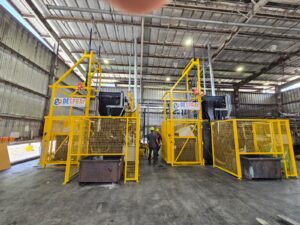GARA pushes for industry-wide aerosol recycling transformation

Even in the most progressive regions, recycling rates struggle to surpass 20%, exposing a major environmental and safety challenge within waste management systems, said Mike Mackay, co-founder of GARA (Global Aerosol Recycling Association).
Aerosol recycling has long been hindered by unique end-of-life issues. Flammable propellants and residual hazardous liquids turn used cans into fire and explosion hazards, prompting many material recovery facilities (MRFs) and waste handlers to divert billions of cans to incineration or landfill rather than risk processing them.
“This is not neglect - it’s self-preservation,” continued MacKay, who, along with CEO Eelco Osse, has dedicated 37 years to advancing safe, effective recycling solutions.
“Recycling infrastructure is largely unequipped to handle aerosols, and conflicting regulations only make matters worse. In the United States alone, one state may label aerosols as recyclable, while another classifies them as hazardous waste.”
The result is a fractured, underperforming system that fails to align with the growing demand for circular economy solutions. According to GARA’s multi-country studies, a typical “empty” aerosol can retains 25% of its content - a mix of gas, liquid and metal that could otherwise be recovered and reused.
GARA is working to rewrite this reality through patented, safety-certified technology that fully automates aerosol recycling. The system captures volatile gases, collects liquid for energy recovery, and processes clean aluminium and steel for reuse. It is supported by five global patents, including a method for converting contaminated propellants into EU-compliant end-of-waste fuel.
A soon-to-be-patented breakthrough from GARA achieves 100% capture of volatile organic compounds (VOCs) - a major leap in environmental safety and resource efficiency.
Additionally, its AI-powered sorting system identifies and separates aerosols by type (e.g., cosmetics, lubricants, paints), allowing for adaptable integration into existing MRFs.
“This isn’t theoretical,” MacKay explained. “We’ve backed our claims with over a decade of operational data, video documentation, and detailed logs. The problem isn’t awareness - it’s the lack of adoption.”
While costs remain a concern, MacKay stresses the far higher cost of inaction. Kerbside programmes routinely reject aerosols due to fire risk, and most global recycling plans fail to account for the infrastructure needed to recycle these ubiquitous products. Yet there are bright spots: Germany’s 70% collection rate proves that high recovery rates are possible with the right tools and public policy alignment.
To lead this transformation, MacKay founded GARA, a global hub aimed at unifying recyclers, supply chains, fillers and industry stakeholders. The organisation offers practical tools, educational materials, and data-driven strategies to push for a 50% global recycling rate by 2030.
GARA has already self-funded a PhD thesis on aluminium aerosol recycling, with results expected shortly. This research is focused on improving recovery efficiency, particularly addressing challenges posed by plastic components in aluminium blocks—critical for cutting emissions given aluminium’s substantial environmental footprint.
“The technology exists. The urgency is real. The time for white papers is over,” said MacKay. “We need action. We need industry-wide support. GARA is ready - but we can’t do it alone.”











